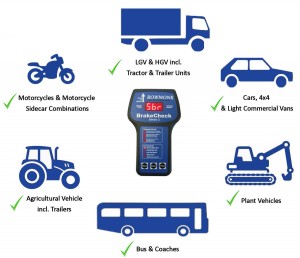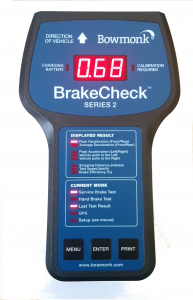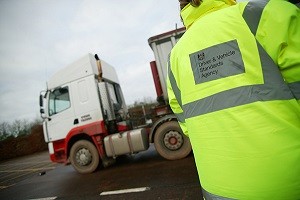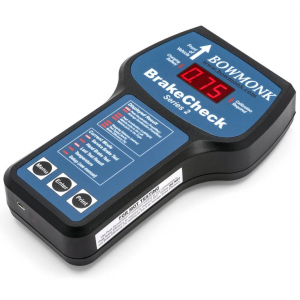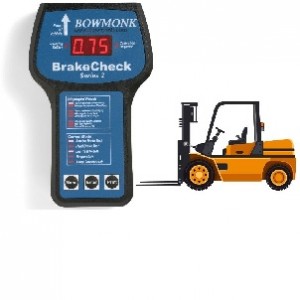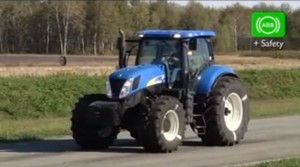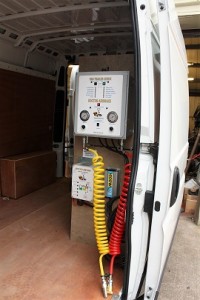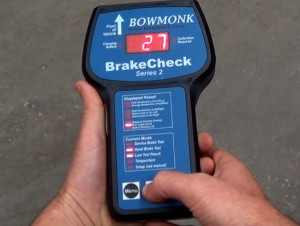HGV / Commercial Vehicle Brake Testing
Although the DVSA states a preference for roller brake testers during safety inspections, it does allow the use of portable decelerometers. What are their advantages and limitations of using portable decelerometers?
Every safety inspection must assess the braking performance of a vehicle or trailer. It’s a key part of any maintenance regime and demonstrates that operators are running their fleets in a compliant manner and protecting other road users. The DVSA’s Guide to Maintaining Roadworthiness states that using an approved and calibrated decelerometer is acceptable to measure overall brake efficiency values for vehicles as part of the yearly maintenance scheme.
We do hear that testers are “strongly advised” to use a calibrated roller brake tester (RBT) at each safety inspection to measure individual brake performance and overall braking efficiencies for the vehicle or trailer according to the annual test standards.
Why is this? And when should each type be used?
There are two main types of portable decelerometer: digital and mechanical. Both are straightforward to use, although care has to be taken: “To use a decelerometer, the vehicle must be driven on the road, or in a yard with enough space. This should be a good surface, which is suitable in wet or dry conditions, with little traffic.
As the guidance states the use of an RBT or calibrated decelerometer can be used, it is obvious to most that a roller brake tester is far better way of determining brake efficiency. Very true would be an educated response although a combination of Roller Brake Tests and regular decelerometers test is as good a record of brake tests as possibly can be offered.
So is a portable decelerometer vulnerable to mis-testing?, a DVSA spokesman explains: “Anecdotally, the DVSA is aware of potential risks due to user error, although the DVSA has no data on this. Also, roller brake testing provides a more consistent test, whereas decelerometer use may involve some environmental variations such as test speed, road surface, weather, or gradient of the road.”
Speaking about the restriction on using decelerometers with tractor-trailer combinations, the spokesman adds: “Assessing different parts of a tractor and trailer combination can be difficult with only a decelerometer. For this reason, rigid vehicles such as buses and non-articulated lorries are more acceptable uses of decelerometers.”
The DVSA spokesman says that manufacturers provide guidance on the use of decelerometers. Risk assessments need to be in place where decelerometers are being used for brake testing, and the tests must be carried out under controlled and safe conditions.
Another decelerometer supplier is Bowmonk. Its portable brake testing kit, BrakeCheck, is also approved by the DVSA. Bowmonk says RBTs are not more accurate, but are preferred for annual tests because they “provide a means of recording each individual brake performance, whereas a decelerometer records the overall braking performance”. He adds: ”DVSA allows all operators to use a BrakeCheck for all of their interim brake tests that form part of their scheduled safety inspections.”
Bowmonk’s equipment was approved because it was able to demonstrate that the readings of overall braking efficiency and percentage of braking imbalance recorded by the device were within a specified level of tolerance, compared to that of an RBT. “BrakeCheck records the rate of acceleration from vehicle rest to the point where the brakes are applied. At this point it detects the forces being shifted forward, and then records the rate of deceleration to the point where the vehicle comes to a complete stop. From this, BrakeCheck then calculates the stopping distance, test speed and ultimately the braking efficiency.”
Any competent vehicle technician can use a BrakeCheck decelerometer without training, although training can be offered.
Adds Dave Wood, DVSA enforcement policy manager: “Under controlled and limited situations, decelerometer testing still has a place. As electronic braking performance monitoring systems gain popularity, we would like to encourage operators to use such systems as part of their vehicle defect monitoring and maintenance regime.”
FIXED BRAKE TESTERS
DVSA says it strongly advises calibrated RBTs “because this is the method of brake testing used by the MOT and is supported by legislation“.
Steve Coles, head of MOT operations at the Retail Motor Industry Federation, confirms that an RBT measures a greater number of elements of brake performance than a decelerometer. He states: “Performance efficiency, binding, fluctuation, increase and reduction of brake effort can all be measured, whereas a decelerometer can only check efficiency and a very rudimentary check of imbalance, which is subjective rather than measured.”
One reason DVSA prefers RBTs is road safety: “Having vehicles conduct emergency stops on public roads using a decelerometer carries a certain risk to other road users that is alleviated if the vehicle is tested in a workshop using an RBT.”
Approved MOT stations must have a fixed brake tester, either roller brake (pictured above) or plate brake tester. Boston’s Tabor says: “Roller brake testers are the most commonly used, since they require less space. The only exception to a fixed brake tester may be a remote part of the country, for example some Scottish islands, but this is rare, if not now a discontinued practice.”
To meet DVSA criteria, all equipment used in the test lane – fixed or otherwise – has to be approved by, for example, the Garage Equipment Association (list of approved equipment: ). Explains Tabor: “The reason for this is to make sure that regardless of where the vehicle is tested and on what make of equipment, the result will be the same. To maintain accuracy, fixed brake testers must be calibrated every six months and certificates to prove accuracy are issued to the test station. Decelerometers must meet mandatory standards and also need calibrating every two years. The longer period between calibrations is because they are only there for temporary use.”
FURTHER INFORMATION
For a meaningful brake test, DVSA recommends that the vehicle should be at least 65% loaded, where possible.
BOX: CRIME AND PUNISHMENT
In 2017, the boss of Grittenham Haulage and its mechanic were jailed after one of their tipper trucks crashed, killing four people, due to faulty brakes. The judge at Bristol Crown Court said Matthew Gordon and Peter Wood had a “cavalier“ attitude to vehicle maintenance at their firm before the incident in 2015.
Gordon told the court that he had been unaware brake checks had to be carried out every four months and admitted that he didn’t have a transport manager in place. Gordon was jailed for more than seven years; Wood for more than five.
After the sentencing, DCI Richard Ocone said: “Detailed and complex investigations showed many of the faults on the vehicle were longstanding – highlighted by the fact that the brakes on the lorry at the time of the crash were totally inadequate, having an overall efficiency of just 28%.”
Bowmonk BrakeCheck Purchase Online
Or call 0115 8456471 to discuss your HGV brake maintenance requirement
